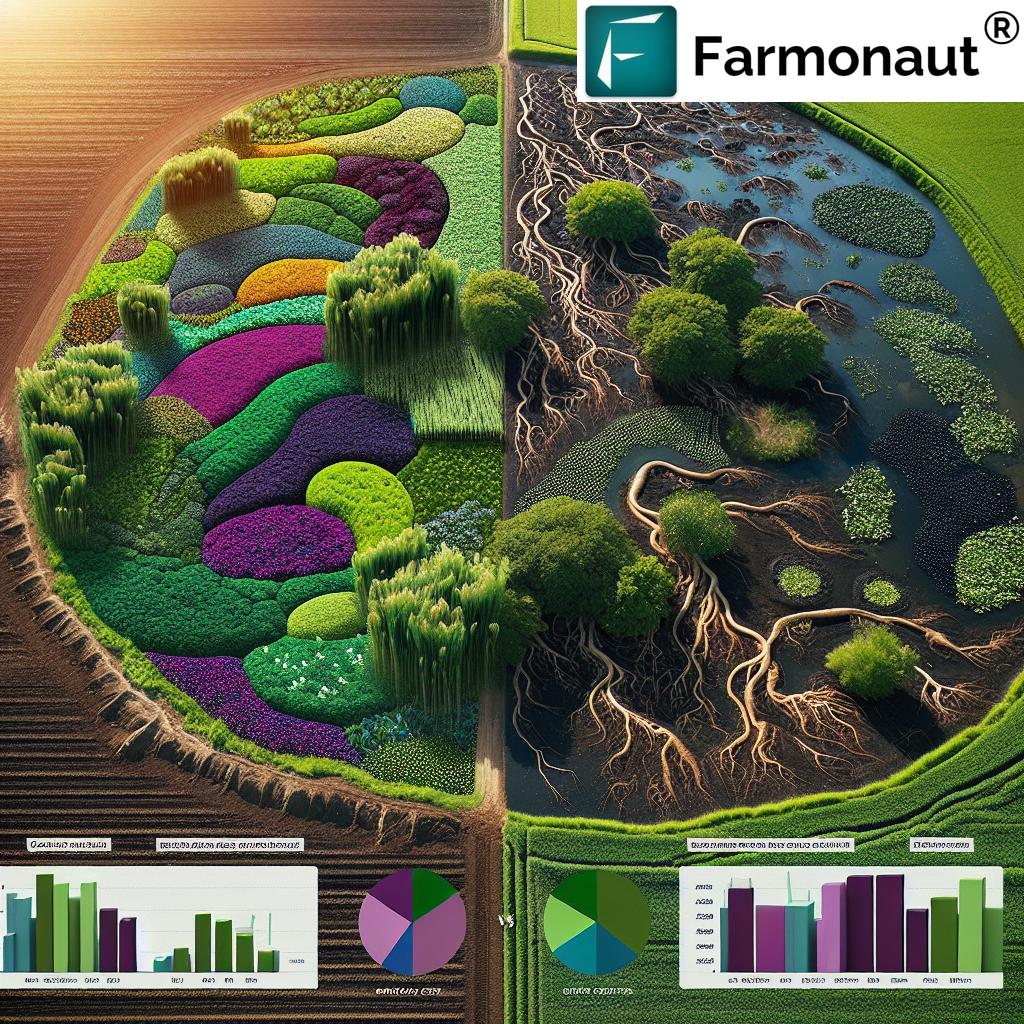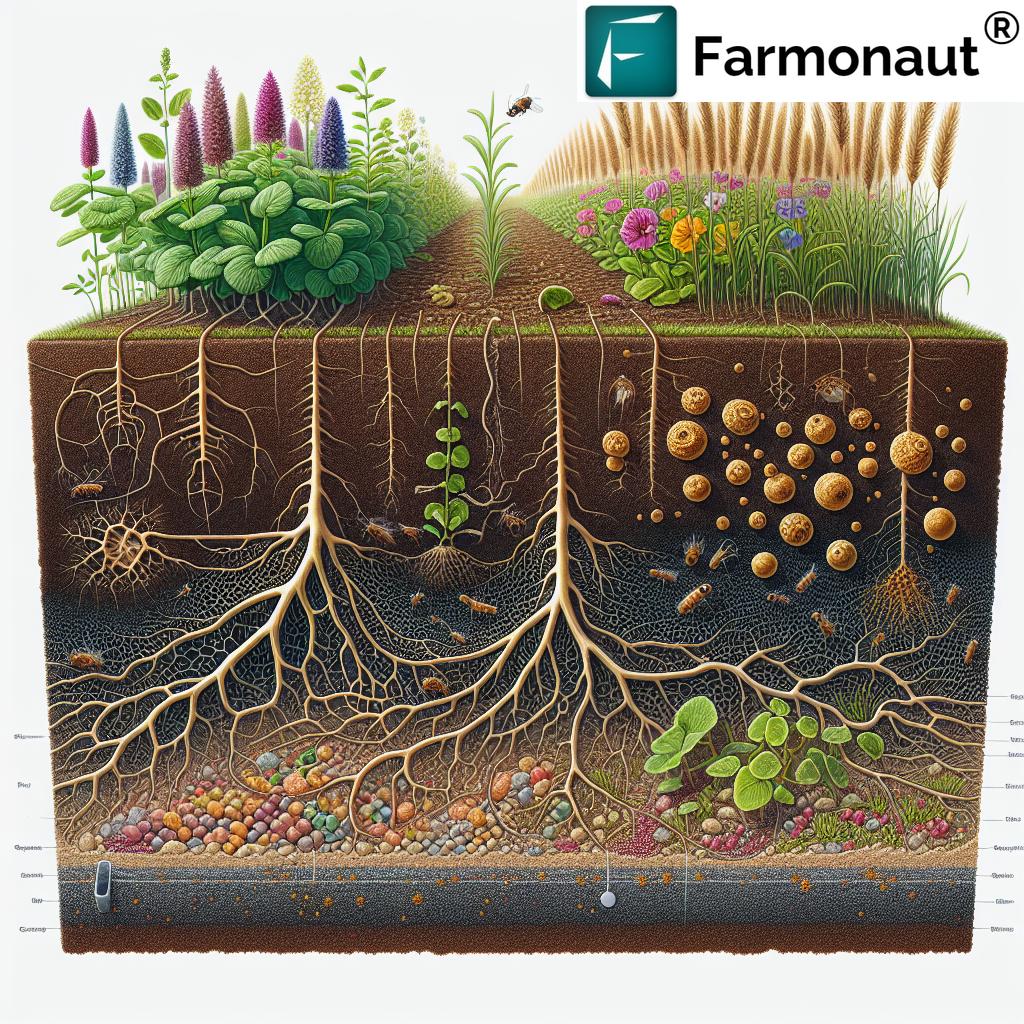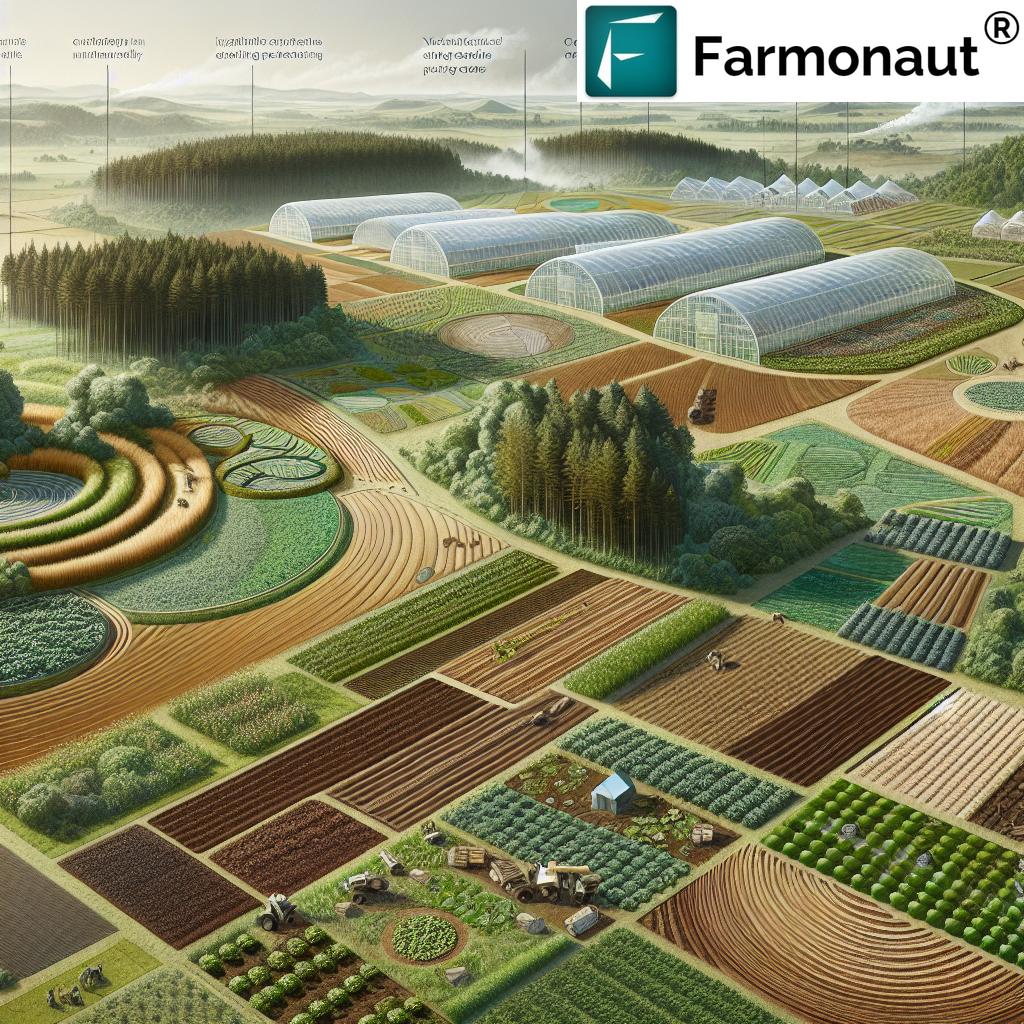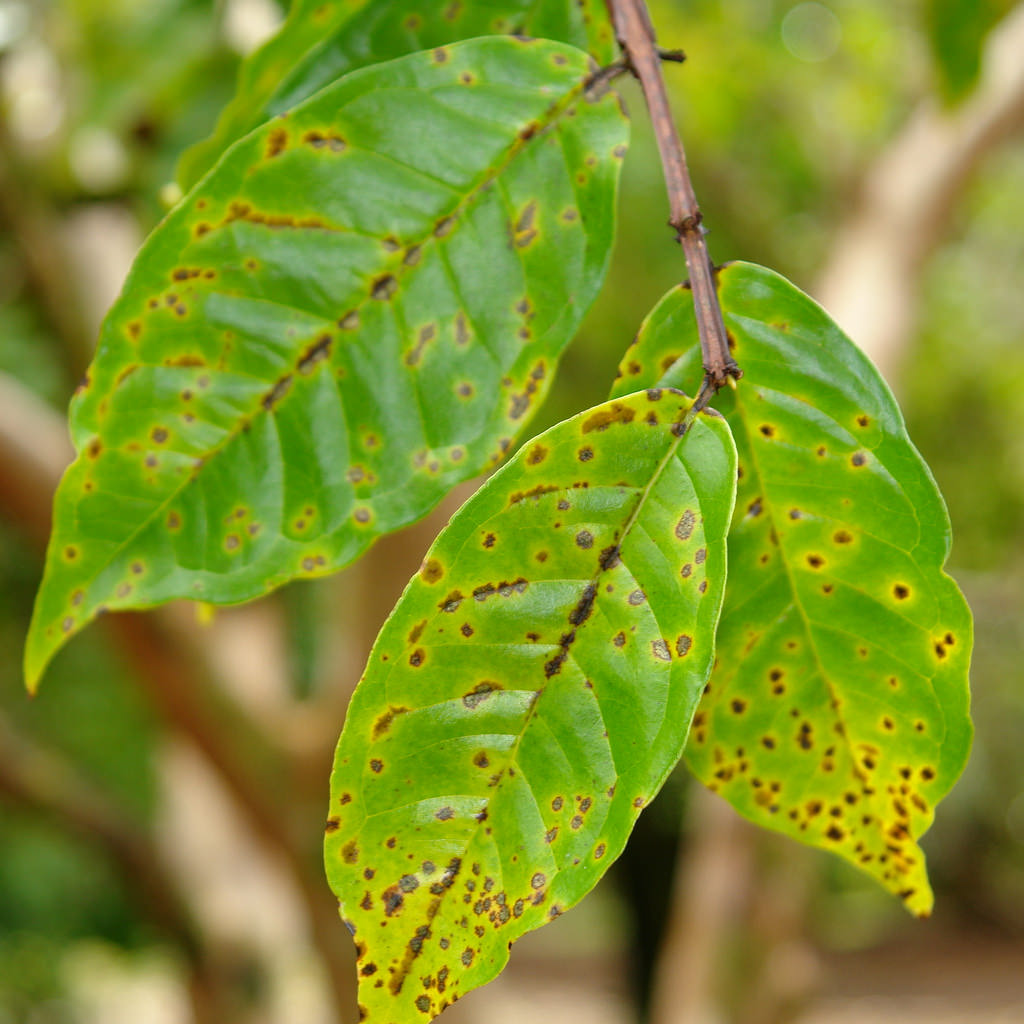Unlocking Sustainable Profits: How Cover Crops Revolutionize Soil Health and Farm Economics

“Cover crops can reduce fertilizer costs by up to 50% while improving soil health and increasing crop yields.”
In the ever-evolving world of agriculture, we at Farmonaut are committed to bringing you the latest innovations in sustainable farming practices. Today, we’re diving deep into the transformative power of cover crops and how they’re reshaping the landscape of modern agriculture. As we explore this topic, we’ll uncover the secrets behind improved soil health, enhanced nutrient management, and the economic benefits that come with adopting these eco-friendly techniques.
The Cover Crop Revolution: A Game-Changer for Sustainable Agriculture
Cover crops have emerged as a cornerstone of sustainable agriculture practices, offering a multitude of benefits that extend far beyond the surface. These crops, planted primarily to manage soil erosion, fertility, and quality, are revolutionizing the way we approach farm management and soil health improvement.
- Soil Health Enhancement: Cover crops play a crucial role in boosting soil organic matter, improving soil structure, and promoting beneficial microbial activity.
- Nutrient Management: They help in efficient nutrient cycling, reducing the need for synthetic fertilizers and minimizing nutrient leaching.
- Water Conservation: By improving soil structure and water infiltration, cover crops contribute significantly to water conservation in agriculture.
- Pest and Disease Control: Many cover crop species can help suppress weeds and break pest and disease cycles, reducing the reliance on chemical interventions.
At Farmonaut, we understand the importance of these sustainable agriculture practices. Our satellite-based farm management solutions provide real-time insights into crop health, helping farmers make informed decisions about cover crop implementation and management.
The Economic Impact of Cover Crops
While the ecological benefits of cover crops are well-documented, their economic advantages are equally compelling. Let’s break down how these unassuming plants can lead to substantial financial gains for farmers:
- Reduced Input Costs: By naturally enhancing soil fertility, cover crops can significantly decrease the need for synthetic fertilizers, leading to lower input costs.
- Improved Yield Potential: The enhanced soil health resulting from cover crop use often translates to increased yield potential for cash crops.
- Erosion Control: By protecting topsoil from erosion, cover crops help preserve the farm’s most valuable asset – its soil.
- Livestock Integration: Many cover crops can double as forage for livestock, providing an additional income stream or reducing feed costs.
Our Jeevn AI Advisory System at Farmonaut analyzes satellite data to provide personalized recommendations on cover crop selection and management, helping farmers maximize these economic benefits.
The Science Behind Soil Health
To truly appreciate the impact of cover crops, we need to delve into the science of soil health. Healthy soil is a complex ecosystem teeming with life, and cover crops play a vital role in nurturing this underground world.
- Organic Matter Building: Cover crops contribute to the build-up of organic matter in the soil, which is crucial for long-term fertility and soil structure.
- Microbial Activity: The diverse root systems of cover crops create an ideal environment for beneficial microorganisms, including bacteria and fungi, which are essential for nutrient cycling.
- Soil Structure Improvement: The roots of cover crops help break up compacted soil, creating pore spaces that improve water infiltration and air movement.
At Farmonaut, our satellite imagery and AI-driven insights help farmers monitor these soil health indicators over time, allowing for data-driven decisions in cover crop management.
Explore our API for detailed soil health data
“Studies show that cover crops can increase soil organic matter by 1-2% over 5 years, enhancing water retention and nutrient cycling.”
Nutrient Management: The Cover Crop Advantage
One of the most significant benefits of cover crops lies in their ability to manage nutrients efficiently. This natural approach to nutrient management not only reduces costs but also minimizes environmental impact:
- Nitrogen Fixation: Legume cover crops, such as alfalfa and clover, can fix atmospheric nitrogen, reducing the need for synthetic nitrogen fertilizers.
- Nutrient Scavenging: Deep-rooted cover crops like radishes can capture nutrients from deep soil layers, preventing leaching and making these nutrients available for the next crop.
- Organic Matter Decomposition: As cover crops decompose, they release nutrients slowly, providing a steady supply to subsequent crops.
Our precision agriculture technology at Farmonaut helps farmers track nutrient levels in real-time, optimizing the use of cover crops for maximum nutrient efficiency.
Water Conservation: A Hidden Benefit
In an era of increasing water scarcity, the role of cover crops in water conservation cannot be overstated. These plants contribute to water management in several ways:
- Improved Infiltration: Cover crop roots create channels in the soil, allowing water to penetrate deeper and reducing runoff.
- Increased Water Holding Capacity: The addition of organic matter from cover crops improves the soil’s ability to retain moisture.
- Reduced Evaporation: Living cover crops and their residues act as a mulch, reducing water loss through evaporation.
Farmonaut’s satellite-based monitoring systems help farmers track soil moisture levels, enabling precise irrigation management in conjunction with cover crop strategies.
Combating Soil Compaction
Soil compaction is a silent yield robber, but cover crops offer an effective, natural solution to this pervasive problem:
- Root Penetration: Deep-rooted cover crops like tillage radishes can break through compacted layers, creating pathways for water and roots of subsequent crops.
- Soil Structure Improvement: The diverse root systems of cover crop mixes help create a more porous soil structure, reducing compaction over time.
- Biological Decompaction: Cover crops support earthworm populations and other soil fauna that naturally aerate the soil.
Our AI-powered advisory system at Farmonaut can help identify areas of potential compaction and recommend appropriate cover crop strategies to address these issues.
The Role of Organic Matter in Sustainable Farming
Organic matter is the lifeblood of healthy soil, and cover crops are one of the most effective ways to increase organic matter content:
- Carbon Sequestration: Cover crops capture atmospheric carbon and store it in the soil, contributing to climate change mitigation.
- Soil Fertility: As organic matter decomposes, it releases nutrients, enhancing long-term soil fertility.
- Water Retention: Increased organic matter improves the soil’s water-holding capacity, making farms more resilient to drought.
At Farmonaut, our satellite imagery and AI analysis can track changes in organic matter over time, helping farmers quantify the impact of their cover crop strategies.

Building a Thriving Agricultural Ecosystem
Cover crops play a crucial role in creating a balanced and thriving agricultural ecosystem:
- Biodiversity Boost: Cover crops provide habitat for beneficial insects, pollinators, and wildlife.
- Natural Pest Control: Certain cover crop species can help suppress harmful nematodes and other pests.
- Soil Microbial Health: The diverse root exudates from cover crops support a rich soil microbial community.
Our blockchain-based traceability solutions at Farmonaut can help farmers document and showcase their ecosystem-building efforts, adding value to their products in the marketplace.
Strategic Crop Rotation with Cover Crops
Integrating cover crops into a well-planned crop rotation strategy can amplify their benefits:
- Disease Break: Cover crops can interrupt disease cycles, reducing the pressure on cash crops.
- Nutrient Balancing: Alternating between different cover crop types can help balance soil nutrients over time.
- Soil Structure Variety: Different root structures of various cover crops contribute to diverse soil improvements.
Farmonaut’s AI-driven crop rotation planner can help farmers optimize their cover crop selections based on their specific field conditions and goals.
Check out our API Developer Docs for advanced crop rotation planning
Precision Farming and Cover Crops: A Powerful Combination
The integration of precision farming techniques with cover crop management can lead to even greater benefits:
- Targeted Application: Use precision technology to apply cover crop seeds more efficiently.
- Variable Rate Planting: Adjust cover crop seeding rates based on soil variability within fields.
- Data-Driven Decisions: Use satellite imagery and soil data to make informed decisions about cover crop termination timing.
Farmonaut’s suite of precision agriculture tools, including our satellite-based crop health monitoring, can help farmers implement these advanced strategies effectively.
Economic and Ecological Benefits of Cover Crops
| Cover Crop Type | Soil Health Benefits | Nutrient Management Advantages | Water Conservation Effects | Estimated Reduction in Fertilizer Costs (%) | Potential Yield Increase (%) | Soil Compaction Mitigation | Organic Matter Contribution | Pest and Disease Management | Long-term Soil Fertility Impact |
|---|---|---|---|---|---|---|---|---|---|
| Legumes (e.g., Clover, Vetch) | Improves soil structure, increases nitrogen | Fixes atmospheric nitrogen | Moderate improvement in water retention | 30-50 | 10-20 | Moderate | High | Breaks pest cycles | Significant improvement in nitrogen levels |
| Grasses (e.g., Rye, Oats) | Enhances soil structure, reduces erosion | Scavenges excess nutrients | High improvement in water infiltration | 20-40 | 5-15 | High | Very High | Suppresses weeds | Long-term improvement in soil structure |
| Brassicas (e.g., Radish, Mustard) | Alleviates soil compaction, improves drainage | Deep nutrient scavenging | Moderate to high water conservation | 25-45 | 8-18 | Very High | Moderate | Biofumigation effect | Improved soil tilth and nutrient availability |
Frequently Asked Questions
Q: How do cover crops contribute to sustainable agriculture?
A: Cover crops enhance soil health, improve nutrient management, conserve water, reduce erosion, and promote biodiversity, all of which are key components of sustainable agriculture practices.
Q: Can cover crops really reduce fertilizer costs?
A: Yes, cover crops can significantly reduce fertilizer costs by fixing nitrogen (in the case of legumes) and scavenging nutrients from deep soil layers, making them available for subsequent crops.
Q: How do cover crops improve water conservation in agriculture?
A: Cover crops improve soil structure, increase water infiltration, reduce runoff, and enhance the soil’s water-holding capacity, all contributing to better water conservation.
Q: What role do cover crops play in combating soil compaction?
A: Deep-rooted cover crops can penetrate compacted soil layers, creating channels for water and roots of future crops, while also improving overall soil structure.
Q: How can Farmonaut help in implementing cover crop strategies?
A: Farmonaut provides satellite-based crop health monitoring, AI-driven advisory services, and precision agriculture tools that can help farmers optimize their cover crop selection, management, and integration into their overall farming system.
Conclusion: Embracing the Future of Sustainable Farming
As we’ve explored throughout this article, cover crops are more than just a trend in sustainable agriculture – they’re a fundamental shift in how we approach farming. By improving soil health, enhancing nutrient management, conserving water, and boosting overall farm economics, cover crops are paving the way for a more resilient and profitable agricultural future.
At Farmonaut, we’re committed to supporting farmers in this transition to more sustainable practices. Our cutting-edge agritech solutions provide the data-driven insights needed to maximize the benefits of cover crops and unlock the full potential of your land.
As we look to the future, it’s clear that the integration of cover crops, precision agriculture, and sustainable farming practices will be key to meeting the global challenges of food security and environmental conservation. By embracing these innovations, we can create a more sustainable, productive, and profitable agricultural system for generations to come.
Ready to revolutionize your farming practices with cover crops? Explore Farmonaut’s suite of tools and services to start your journey towards more sustainable and profitable farming today.















